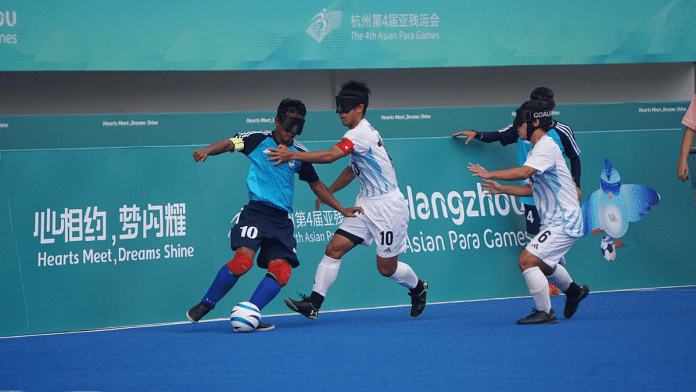Thank you dear subscribers, we are overwhelmed with your response.
Your Turn is a unique section from ThePrint featuring points of view from its subscribers. If you are a subscriber, have a point of view, please send it to us. If not, do subscribe here: https://theprint.in/subscribe/
Krishna’s Diplomacy in the Mahabharata and Contemporary Sports Diplomacy
The Mahabharata tells a fierce story of strategy, diplomacy, and power. In one defining episode, Krishna shapes the outcome of Draupadi’s swayamvara by guiding the archery contest. He does not pick up a bow, yet he steers events with clarity and purpose. He ensures that merit defeats might, and justice outshines manipulation. Today, nations mirror Krishna’s strategy through sports diplomacy. At the 2023 Asian Games, India and China did more than compete in athletics—they battled for influence and shaped global narratives. India, like Krishna, uses sport not just to earn medals, but to tip the balance of power with precision and principle.
Krishna’s Strategic Role in the Archery Contest
At Draupadi’s swayamvara, Krishna ensured that the contest rewarded skill, not lineage. Arjuna, disguised and exiled, faced a task that tested precision: shooting a revolving target while looking only at its reflection. The challenge filtered out the arrogant and entitled. Krishna guided Arjuna to success without ever drawing a bow himself. By doing so, he tilted the outcome toward righteousness. He didn’t interfere through force—he structured the rules to reward competence.
This move secured Draupadi’s hand for Arjuna, strengthening the Pandavas’ political base through a powerful alliance. It also reinforced a moral order: that power gained through merit is more legitimate than that claimed through privilege (Hiltebeitel, 2001). Krishna’s diplomacy thus worked on three levels: it legitimized merit, forged alliances, and challenged the unearned dominance of the Kauravas.
Modern Parallel: The Asian Games 2023
Modern sports diplomacy follows the same script. India used the 2023 Asian Games not just for athletic triumphs, but for asserting a narrative of fairness, pluralism, and rule-based engagement. China, the host, played the antagonist by denying entry to Indian athletes from Arunachal Pradesh. This symbolic snub reflected Beijing’s refusal to recognize the state as Indian territory (Ministry of External Affairs, 2023). Like Duryodhana barring the Pandavas from their rightful inheritance, China flexed power instead of upholding fairness.
China also used the Games to showcase technological and organizational prowess. From AI-driven stadiums to net-zero energy infrastructure, China used spectacle to assert regional leadership (Xinhua, 2023). Its dominance in medal counts signaled not just athletic strength, but geopolitical ambition. India, in contrast, stayed firm, using its presence, protests, and performance to claim moral high ground—just as Krishna had once guided the Pandavas to do.
Lessons from Krishna: Strategic Alliances and Soft Power
Krishna’s success came not from brute power, but from aligning with virtue and building coalitions. India has followed suit. Through cricket diplomacy, it strengthened ties in South Asia. It deepened cultural connections with Japan via judo and youth exchanges. In the United States, India partnered through sports like basketball and cricket to enhance people-to-people ties (Ministry of Youth Affairs & Sports, 2023). These strategic moves build durable alliances that counterbalance China’s economic diplomacy.
Moreover, soft power matters. Krishna didn’t dominate the contest; he guided it. India, too, relies on soft power through sports to raise its global stature. Hosting the ICC Cricket World Cup 2023 allowed India to engage diplomatically with visiting nations. Bidding for the 2036 Olympics shows strategic ambition. Reviving the South Asian Games and promoting kabaddi for Olympic inclusion reinforces India’s cultural narrative (NITI Aayog, 2023).
Chennai’s successful hosting of the Chess Olympiad in 2022 highlighted India’s leadership in mind sports. Its growing role in the International Chess Federation (FIDE) strengthens its global footprint. Like Krishna’s subtle counsel, these moves don’t scream for attention—they signal depth, competence, and long-term vision.
Political Signaling through Sports
Sports stage more than contests—they stage power. The archery challenge in the Mahabharata was not a mere game; it was Krishna’s political message. Today, global sporting events serve the same purpose. When India enters the arena, it speaks we stand for merit, dignity, and inclusion. During the Asian Games controversy, India responded with clarity and firmness. It reminded the world that fair play must override coercion. In this modern arena, Krishna’s lessons still guide. Diplomacy demands vision. Alliances need patience. Power must serve principle. When India competes with these values, it plays the long game—just as Krishna did in the court of Panchala.
References
Hiltebeitel, A. (2001). Rethinking the Mahabharata: A Reader’s Guide to the Education of the Dharma King. University of Chicago Press.
Ministry of External Affairs. (2023). Statement on denial of entry to Indian athletes from Arunachal Pradesh for Asian Games 2023. Government of India. https://www.mea.gov.in
Ministry of Youth Affairs & Sports. (2023). Annual report on international sports collaborations. Government of India. https://yas.nic.in
NITI Aayog. (2023). India@100: Leveraging sports for soft power diplomacy. https://niti.gov.in
Xinhua. (2023). Hangzhou 2023: China’s showcase of innovation and efficiency. Xinhua News Agency. https://www.xinhuanet.com
These pieces are being published as they have been received – they have not been edited/fact-checked by ThePrint.


